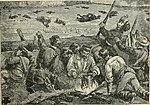The Battle of Cold Harbor was fought during the American Civil War near Mechanicsville, Virginia, from May 31 to June 12, 1864, with the most significant fighting occurring on June 3. It was one of the final battles of Union Lt. Gen. Ulysses S. Grant's Overland Campaign, and is remembered as one of American history's most unnecessary and lopsided battles. Thousands of Union soldiers were killed or wounded in a hopeless frontal assault against the fortified positions of Confederate Gen. Robert E. Lee's army.
On May 31, as Grant's army once again swung around the right flank of Lee's army, Union cavalry seized the crossroads of Old Cold Harbor, about 10 miles northeast of the Confederate capital of Richmond, Virginia, holding it against Confederate attacks until the Union infantry arrived. Both Grant and Lee, whose armies had suffered enormous casualties in the Overland Campaign, received reinforcements. On the evening of June 1, the Union VI Corps and XVIII Corps arrived and assaulted the Confederate works to the west of the crossroads with some success.
On June 2, the remainder of both armies arrived and the Confederates built an elaborate series of fortifications 7 miles long. At dawn on June 3, three Union corps attacked the Confederate works on the southern end of the line and were easily repulsed with heavy casualties. Attempts to assault the northern end of the line and to resume the assaults on the southern were unsuccessful.
Although he was far more optimistic at the time, Grant said of the battle in his Personal Memoirs, "I have always regretted that the last assault at Cold Harbor was ever made. ... No advantage whatever was gained to compensate for the heavy loss we sustained." In fact, he was thinking about another attack two days later. The armies confronted each other on these lines until the night of June 12, when Grant again advanced by his left flank, marching to the James River. In the final stage, Lee entrenched his army within besieged Petersburg before finally retreating westward across Virginia.






